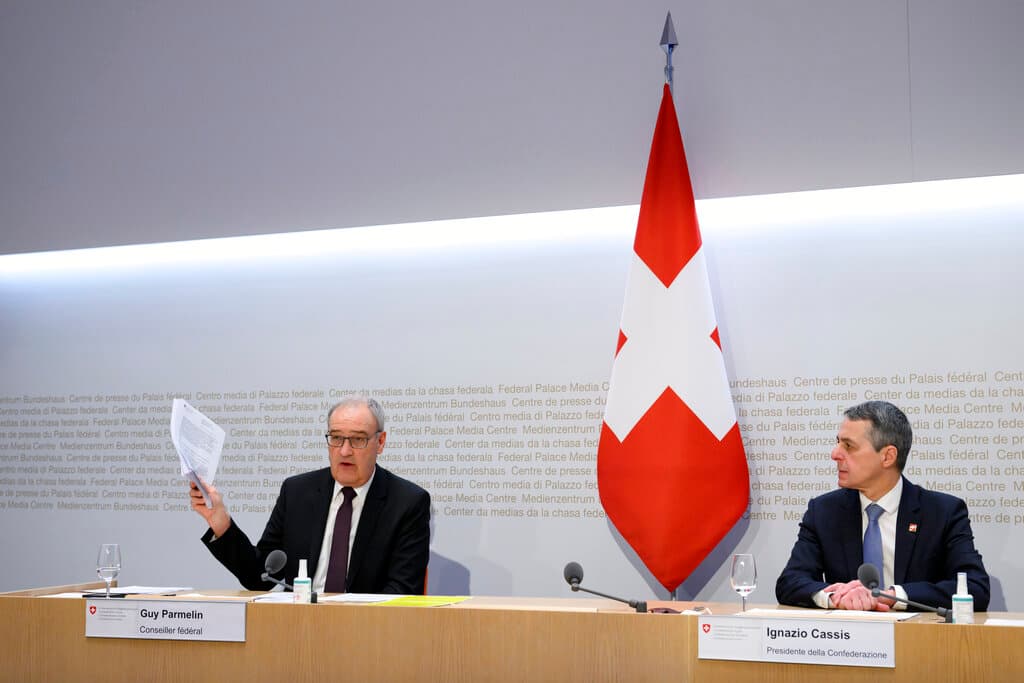Switzerland: Wading Into War
It seems ever more clear that the war in Ukraine is shaping not just Ukraine but all of Europe. Not even Switzerland is immune.

ZURICH — At the height of the Cold War in 1963, Switzerland passed a law requiring every citizen to have a place to shelter in case of an attack. In 1978, the government took the added step of requiring every new building with at least 10 units to have a bomb shelter able to withstand a 12-megaton explosion at a distance of 700 meters. Those that opt not to are fined.
As Ukraine’s Zaporizhzhia nuclear power plant burned under Russian assault, I decided to look for my shelter. I was not alone. On social media and via text, friends began to share information on how to locate their nearest bunker. Swiss government websites assist in the process: Enter your home address and with one click you are directed to your designated place of safety.
My safe haven, it seems, is in my wine cellar. There are worse places to pass an emergency.
While it has not fought a war since 1847, Switzerland is well prepared for one. My shelter is one of some 300,000 private shelters in the country. There are also thousands of military bunkers sprinkled throughout the Swiss mountains — remnants of the réduit national, a defensive plan developed in the 1880s.
Long after other European countries have scrapped compulsory military service, Swiss men must still serve. This has created a robust cohort of trained citizens. At any moment, more than 120,000 men can be called up for active duty.
Switzerland has more guns per capita than Iraq or Pakistan. Every September in Zurich, thousands of teenagers between the ages of 13 and 17 compete in Knabenschiessen, a traditional target shooting competition. Well-armed youth aside — the competition is with designated Swiss Army rifles — the event is much like a Midwestern state fair, Ferris wheels and donuts included.
Preparedness is second nature for a country that popularized pocketknives with corkscrews, toothpicks, and tweezers. Yet the Swiss are at times mocked for their readiness — denounced as “gun crazy” by some and “security obsessed” by others.
Leftist Swiss politicians have over the years also dismissed their countrymen’s propensity for defense as a relic of a Cold War era. They have resorted to referenda to attempt to abolish the bunker laws and mandatory military service — both unsuccessful.
Later this year, the Swiss will likely vote on a proposal to block the government’s purchase of F-35A jets from Lockheed Martin. This now seems unlikely to pass. For the Swiss now seem to have waded into war.
As Russian missiles rained over Ukraine, the Swiss Federal Council on February 28 adopted the European Union’s sanctions on Russia. Last week it widened these sanctions in step with further measures taken by its European neighbors.
Assets of more than 600 persons have been frozen, exports of certain goods to Russia blocked, and Swiss airspace closed to flights to and from Russia. President Cassis and the Swiss Federal Council insist the decision does not breach Swiss neutrality.
They base their argument in a fine distinction between neutrality law and neutrality policy. The former, rooted in the Hague Conventions of 1907, forbids the movement of military personnel and equipment across neutral state territory.
The 1907 conventions outline neutral state behavior during times of conflict. Bern insists its decision is in keeping with these stipulations. It points instead to neutrality policy which, it argues, allows it to take whatever measures necessary to remain a credible neutral power.
Moscow’s actions in Ukraine are so egregious, says the Swiss government in a circumlocution worthy of Orwell, that doing nothing would have been more damaging to Switzerland’s neutrality than the measures it has now chosen to adopt.
Not everyone is convinced.
“By participating in the sanctions, Switzerland is now at war,” Christoph Blocher told the Swiss newspaper Neue Zürcher Zeitung. Between 2004 and 2007, Mr. Blocher was a member of the Swiss Federal Council.
Mr. Blocher remains a prominent figure in the right-wing Swiss People’s Party. “As a neutral country, Switzerland could have made a special contribution. But Switzerland has now recklessly missed this opportunity.”
Under the Swiss constitution, major foreign policy decisions — whether to join international organizations, say, or become party to a treaty — must be put to a public vote. In deciding to impose sanctions on Russia, then, has the Federal Council also disregarded the sacred Swiss principle of direct democracy?
Could this decision yet be the harbinger of a bigger domestic crisis in the Alpine nation? It seems ever more clear, as this column has argued, that the war in Ukraine is shaping not just Ukraine but all of Europe. Not even Switzerland is immune.
The decision taken by the Federal Council will likely reverberate locally and abroad. Gennady Gatilov, Russia’s ambassador to the United Nations in Geneva, has already warned Bern’s resolve will have “certain negative impacts.”
Yet for their part, the Swiss are quite prepared — their readiness once again a source of national pride and comfort rather than an object of left-wing mockery. As for me, should the worst come to pass, I will be in my wine cellar — pocketknife in hand.

